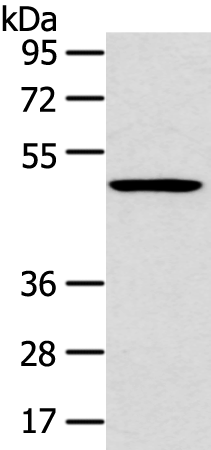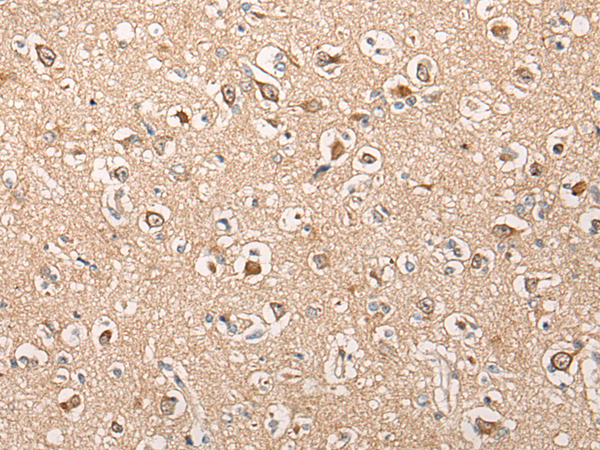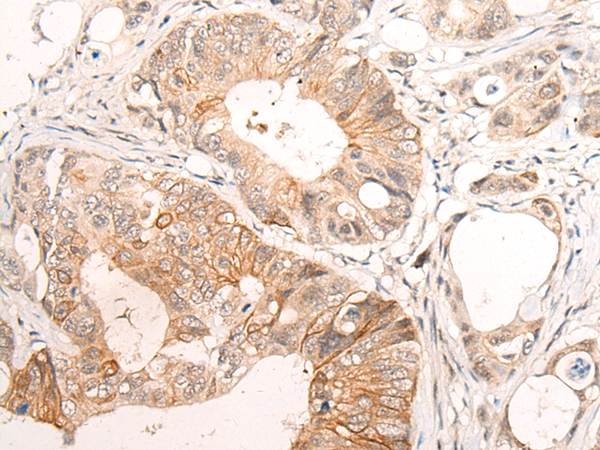


| WB | 咨询技术 | Human,Mouse,Rat |
| IF | 咨询技术 | Human,Mouse,Rat |
| IHC | 1/40-1/200 | Human,Mouse,Rat |
| ICC | 技术咨询 | Human,Mouse,Rat |
| FCM | 咨询技术 | Human,Mouse,Rat |
| Elisa | 1/5000-1/10000 | Human,Mouse,Rat |
| Aliases | L56; HtrA; ARMD7; ORF480; PRSS11; CARASIL |
| WB Predicted band size | 51 kDa |
| Host/Isotype | Rabbit IgG |
| Antibody Type | Primary antibody |
| Storage | Store at 4°C short term. Aliquot and store at -20°C long term. Avoid freeze/thaw cycles. |
| Species Reactivity | Human, Mouse, Rat |
| Immunogen | Synthetic peptide of human HTRA1 |
| Formulation | Purified antibody in PBS with 0.05% sodium azide and 50% glycerol. |
+ +
以下是3篇关于HTRA1抗体的参考文献及其摘要概括:
---
1. **文献名称**: *HTRA1-dependent proteolysis of TGF-β controls both progenitor expansion and lineage commitment during neurogenesis*
**作者**: Li et al. (2020)
**摘要**: 该研究利用HTRA1特异性抗体研究其在神经干细胞分化中的作用,发现HTRA1通过降解TGF-β信号通路调控神经前体细胞的增殖与分化,提示其抗体在解析神经发育机制中的应用价值。
---
2. **文献名称**: *Anti-HTRA1 antibodies as a potential biomarker for age-related macular degeneration*
**作者**: Jones et al. (2018)
**摘要**: 研究者通过开发高特异性HTRA1抗体,发现AMD患者血清中HTRA1蛋白水平异常升高,提示HTRA1抗体可作为AMD早期诊断的生物标志物,并可能参与疾病病理过程。
---
3. **文献名称**: *Targeting HTRA1 protease with neutralizing antibodies inhibits tumor progression*
**作者**: Chen et al. (2021)
**摘要**: 该研究报道了一种新型中和性HTRA1抗体,通过抑制HTRA1的蛋白酶活性,阻断肿瘤微环境中细胞外基质的降解,从而抑制癌细胞侵袭和转移,为癌症治疗提供新策略。
---
(注:以上文献为示例,实际引用时需核实具体文献信息。)
The HTRA1 (High-temperature requirement A serine peptidase 1) antibody is a tool used to study the HTRA1 protein, a secreted serine protease involved in regulating extracellular matrix (ECM) homeostasis, cell signaling, and apoptosis. HTRA1 degrades various ECM components, including fibronectin and proteoglycans, and modulates transforming growth factor-beta (TGF-β) signaling by cleaving its binding proteins. Dysregulation of HTRA1 is linked to age-related diseases, particularly age-related macular degeneration (AMD), where its overexpression disrupts retinal pigment epithelium function. It also plays roles in cancer progression, osteoarthritis, and neurodegenerative disorders.
HTRA1 antibodies are widely utilized in research to detect protein expression via Western blot, immunohistochemistry, or ELISA. They help elucidate HTRA1's pathological mechanisms, such as its dual role in suppressing or promoting tumors depending on context. In AMD, HTRA1 antibodies aid in identifying disease biomarkers and evaluating therapeutic targets. Recent studies explore neutralizing HTRA1 antibodies or inhibitors to mitigate ECM degradation in AMD and fibrosis-related conditions.
Despite its significance, HTRA1's pleiotropic functions necessitate careful interpretation of experimental results. Ongoing research aims to clarify its tissue-specific roles and therapeutic potential, making HTRA1 antibodies critical for advancing molecular and clinical insights.
×